

This series on Bobby Fox’s adventures to Ukraine is excerpted for Untapped from his yet-to-be-published memoir “Love & Vodka” about an American traveling through the harsh and surreal reality of Ukrainian life. In his first post, Bobby survived a memorable Ukranian Airlines experience.
When I finally disembarked off the third plane on my long journey to Ukraine, I was greeted by a foreboding single, small, Soviet-era terminal.
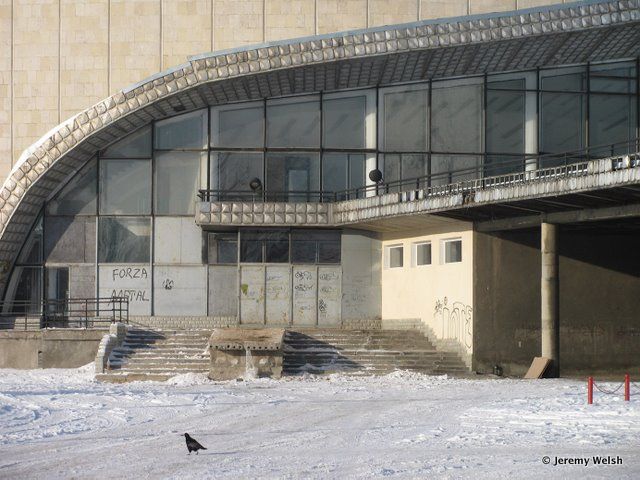
Inside, the stuffy, dingy building, I followed the herd to the passport control room. It was here where I had my first lesson in Ukrainian queues ”” or shall I say, lack thereof. The concept of forming a line is pretty much reduced to a survival of the fittest free-for-all. Perhaps years of Soviet control is to blame for this. I was later told that I wouldn’t survive in Ukraine if I had to live there, where the weak are truly eaten. This is both a compliment and an insult.
After I allowed several people to push their way past me, frustration set in and I started standing my ground by inching a step closer toward the customs booth. As I waited, two Ukrainian men in front of me argued with an official in Russian before being rather forcefully arrested.
With my turn quickly approaching, anxiety crept in. The grim-faced officials with their Soviet-looking, olive-colored uniforms didn’t help matters. As threatening as their stern demeanor appeared, I would soon discover that this expression was status quo for all Ukrainians when out in public. In private, it’s a different story all together ”” warm and hospitable would best describe it.
Before I knew it, my time had come. It was time to meet my maker. As I approached the booth, I nervously dropped my passport, clumsily picked it up off the dirty, grey floor before handing it to the official, who hovered over me like a judge presiding over court. He proceeded to stare at it for what felt like at least a full minute, flipping through the pages, feeling the pages, as though inspecting it for authenticity and periodically looking at me with complete and utter suspicion.
This is how people disappear, never to be heard from again, I thought to myself. My thoughts continued: Hold your composure. You have nothing to hide. But neither did many of those jailed under Stalin.
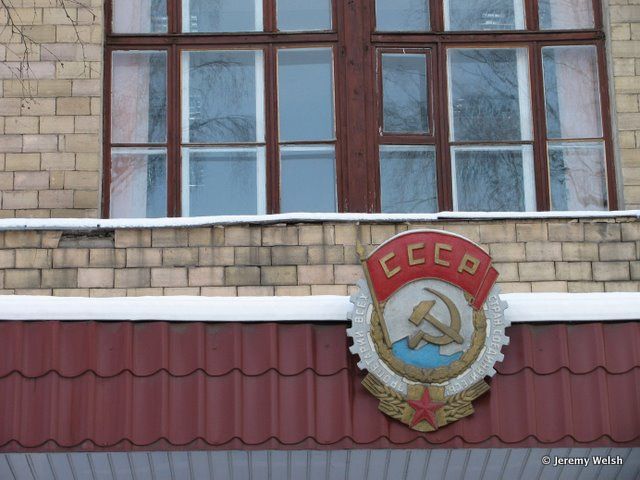
As the official continued thumbing through my passport, I suddenly grew paranoid that he was somehow reading my thoughts, therefore making me feel like I was doing something wrong, which in turn, would give him reason to think I actually was. I was certain that I was about to become victim of the thought police.
He looked at me again. Yep, he’s on to me, I thought. And that’s when he called over another official. They’re closing in on me!, I thought. Just like that other guy who was arrested.
The second official flipped through my passport, just as his cohort had, then stared at me, likely confirming the suspicions already placed upon me as he nodded to his comrade.
And then, in Russian: “What is your purpose visiting Ukraine?”
“I’m sorry, but I don’t speak Russian,” I said.
He repeated himself, in very broken English.
“I’m visiting a friend.”
“What is your friend’s name?”
I gave them her name. Both officials proceeded to stare at me, as though trying to burn a hole through me, as sweat began to drip down my forehead. One of them muttered something in either Russian or English. I couldn’t understand.
Dumbfounded, I asked him to please repeat himself. So he did but I still didn’t understand, nor did I the third time, either.
Frustrated, he finally, however so reluctantly, stamped my passport, handing it back to me in a manner that suggested disappointment for not being able to place me under arrest, before adding:
“Welcome to Ukraine.”
And with that, I was on my way to the next obstacle on the gigantic obstacle course known as Ukraine: Luggage claim. How difficult could that be? I approached the squeaky luggage carousel, which was distinguished by a truly unique feature. Unlike any other luggage carousel I ever encountered, which basically allows luggage to continue to go round and round until claimed, this particular carousel didn’t provide this convenient luxury. In fact, carousel would not be the proper term to describe it. It was simply a conveyor belt that rudely dumped your luggage at the end of the line, forming a heaping pile of luggage on the floor, which in turn caused a feeding frenzy of passengers swarming the pile like vultures on a carcass, searching for their belongings.
Despite my growing impatience, I decided to avoid the feeding frenzy and wait for the crowd to thin out a bit. As I was waiting, I noticed something rather peculiar about the luggage itself. Almost every suitcase was wrapped tightly with cellophane and packing tape, covering every square inch. It didn’t take me long to realize why. Most of the bags that had not been wrapped like mummies were opened ”” or at least partially opened ”” with personal belongings hanging out. So naturally, I assumed this would be the condition I found my luggage in.
As luggage and miscellaneous personal items that had fallen out of it continued to cascade into the stockpile below, I began to panic. Where is mine? I took comfort in the fact that new luggage continued to come through the portal, but it was clearly winding down. And then it came to a stop. I figured, hoped, prayed that it was somewhere in the five-foot pile that had formed at the end of the line. Meanwhile, two people began to fight over the same suitcase, before realizing who its rightful owner was (as it turned out, it didn’t belong to either of them). As the pile grew smaller, so did the crowd swarming around it. And then, there were none. And my luggage was nowhere to be seen.
Desperate, I poked my head through the portal. Nothing. I had no choice but to seek help. I scanned the room and noticed what I assumed to be an information booth. Just as I turned to leave, I heard the conveyor belt hum and buzz, struggling to ramp up before finally starting again. I stared at the portal. Nothing. Waiting, waiting. And lo and behold, there it was. My suitcase! Fully zipped. I grabbed it and headed to the next stop of utter chaos: luggage inspection.
After my suitcase passed through the X-ray machine, I was ordered to open my suitcase. Once again, I was overcome with that irrational paranoia airports create when you begin thinking that maybe you are doing something illegal. As the inspector proceeded to remove every item from my suitcase, I was reminded of how painfully difficult it was to fit everything in there to begin with. And now, I was being granted the opportunity to do it again. While digging through my toiletries bag, the inspector pulled out my prescription allergy medication and held it up to me as though he just found a brick of cocaine.
“What’s it?,” the inspector said in an accusatory, broken-English tone.
“Allergy pills.”
The inspector was clearly confused.
“Allergies. All-er-gies,” I said, still not getting my message across.
The inspector began growing frustrated with our inability to communicate. This wasn’t good. He opened the bottle, sniffing the contents before dumping a couple if pills into his hand to examine them.
I decided to try a different tactic, mimicking several sneezes, and pretending to blow my nose. The inspector nodded in understanding and dumped the pills back into the bottle. It worked!
Twenty minutes later, everything was jammed back into my suitcase, but zipping it shut was another matter all together. No matter what I did, I couldn’t get it to close. I re-arranged some of the items, but this did little to help, but fortunately another inspector came to my aid by sitting on my suitcase.
Now, all that separated me from my pen pal Katya was an opaque sliding door. All I had to do was pass through it. Of course, it wouldn’t be that easy. Once I passed through the doors leading to the lobby, I was greeted by a mob of people awaiting their loved ones, holding enormous bouquets of flowers. And just as Ukrainians don’t like waiting in line, nor do they like moving out of the way of somebody trying to get through. And as if that wasn’t enough, hustling taxi drivers ”” eager for business ”” tugged and grabbed at both me and my luggage in a desperate attempt to take me to destinations unknown. I had no choice but to plow my way through them, desperately hoping that Katya’s first glimpse of me wouldn’t be this savage struggle I was enduring. Of course, it was.
“How was your flight?,” Katya asked upon greeting me, following one of the strangest, most frightening experiences of my life — above ground, on, or below.
“I survived,” I said, too exhausted to get into the shocking details. I had a sneaking suspicion that my “abnormal” experience was “normal” by Ukrainian standards.
“This is my dad,” Katya continued, motioning toward the tall, stern-looking man standing by her side.
“Pleased to meet you,” I said, shaking his rather large hand.
Katya translated.
“Sergei Andreevich. Welcome to Ukraine,” he said in Russian and translated by Katya. (It is important to point out that rather than using the equivalent of ”˜Mr.’ in front of a name, the proper way to greet a man in Russian culture is by calling them by their first and middle name.
Speaking with a translator was something I quickly grew accustomed to, since Katya’s parents could not speak English … nor I Russian. What a perfect combination! It helped that Katya was a remarkably skilled translator. In fact, she was studying to be a translator.
“Did you get any sleep?,” Katya asked.
“Hardly. I can’t sleep on planes,” I replied.
“You must be tired.”
I nodded with a yawn, as Sergei reached for my suitcase.
“Thanks, but I got it,” I said, but he insisted.
We then headed out to the parking lot toward Sergei’s car ”” a white, rusted 1986 Zhiguli. Sergei opened the trunk. I attempted to help him lift my overloaded suitcase into the trunk, but he refused my services once again.
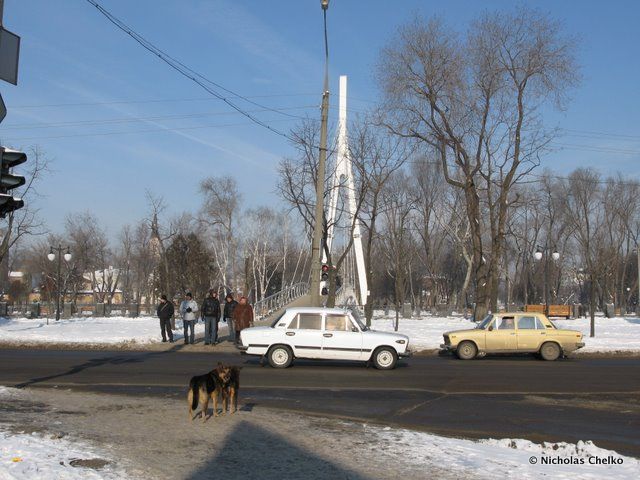
The drive from the airport to their apartment in the middle of the Ukrainian countryside to downtown Dnepropetrovsk was about 20 minutes. Along the way, I was bombarded with reminders that I was in a whole other world. The Cyrillic lettering was perhaps the most obvious reminder.
I also noticed the lack of street signs and ”” more shocking ”” lane markers, a detail that was made more jarring by the free-for-all approach drivers took to the road. Drivers essentially had no choice but to jostle for position and forge their own lanes whenever and wherever they pleased. I couldn’t help but find this to be a striking parallel to Ukrainians’ apparent disdain for forming civilized lines.
Three-quarters of the drive consisted of countryside, before we even got into the city. Unlike the sprawling suburbs of big American cities, big cities in Ukraine are usually completely surrounded by farmland and quaint roadside villages. City limits are taken a lot more literally. It is much like the desert surrounding Las Vegas.
Dnepropetrovsk is an industrial city in eastern Ukraine of a little over one million people on the mighty Dneper River — the third-largest river in Europe. In fact, the river divides the city into the right bank and more industrial left bank.
Dnepropetrovsk was also a center of Soviet missile and rocket building. It certainly would have been a prime target of the U.S. if war between the two superpowers erupted. In fact, during the Cold War, Dnepropetrovsk was a closed-city, which meant very little exposure to the outside world. This goes a long way in explaining the general distrust Ukrainian have towards foreigners to this day ”” especially by the older generations.
Today, Dnepropetrovsk is a bustling city, while still facing the same economic problems that defines modern Ukraine. Like most of eastern Ukraine, Dnepropetrovsk has been living in Russia’s shadow since the collapse of the Soviet Union. As a result, the language, culture and customs are aligned with Russia, unlike the more independent-minded western Ukraine, whose primary language is Ukrainian. Mostly Russian is spoken in eastern Ukraine.
When we first entered the city, I was initially struck by the endless rows of Soviet-era apartment buildings.
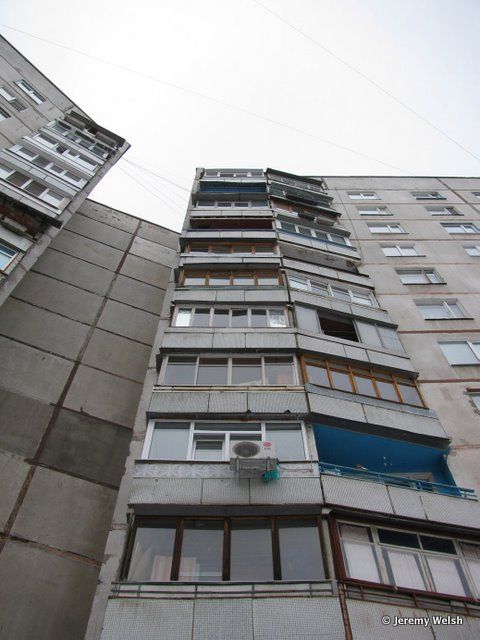
How does one not get lost here?, I thought to myself. Not that the U.S. isn’t marked by sameness ”” especially in the suburbs, where downtown means any combination of Best Buy, Target, Applebees, McDonald’s, Arby’s and Walgreen’s, Wal-Mart and Kohl’s. In fact, we even passed an occasional McDonald’s ”” bright beacons of capitalism (and a welcome relief when one gets tired of native cuisine).
With the exception of McDonald’s, there were remnants of the Soviet Union everywhere. We passed an enormous, abandoned factory that sprawled several blocks and completely enclosed by a crumbling, concrete wall. During the glory days of the Soviet Union, this particular factory made the very missiles aimed in our general direction during the Cold War.
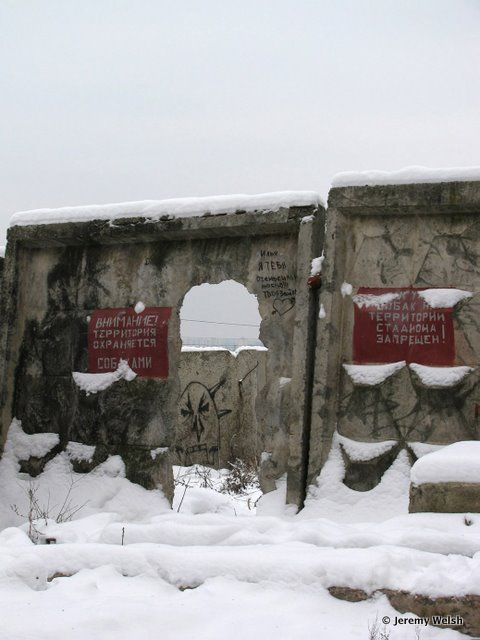
We also passed several large, rusted above-ground pipes running along the road like an enormous Habitrail from the depths of hell.
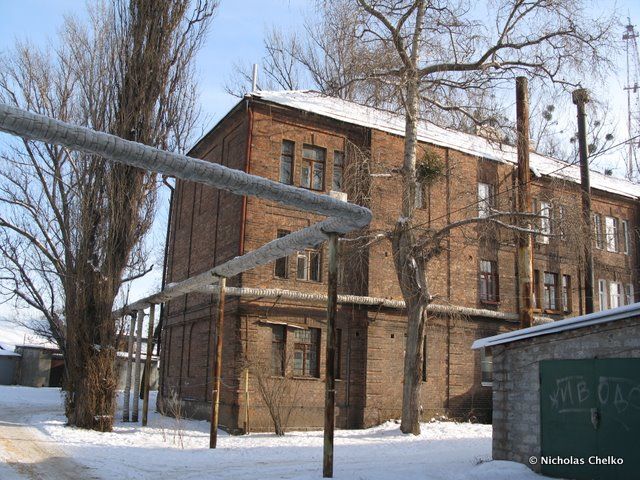
We passed by a statue of Lenin, who I mistook for Stalin. Sergei laughed, explaining that all the statues and streets named after Stalin had been removed and renamed.
“Why not Stalin?,” I innocently asked.
“Because Lenin didn’t murder 60 million people,” Katya said in response. “Although, to many of the older generations ”” nor did Stalin.”
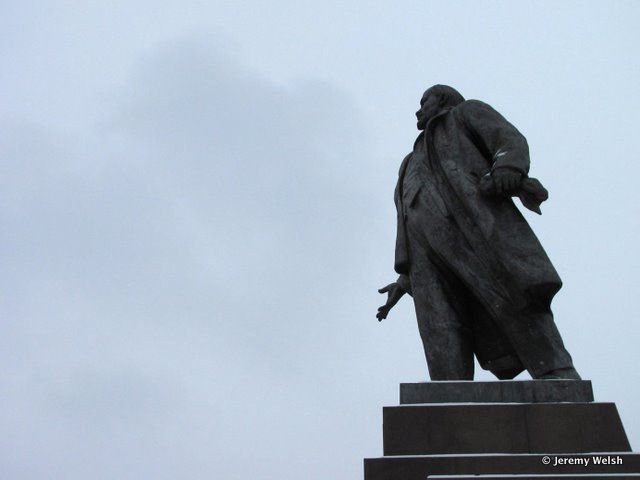
We finally arrived at the white-gray bricked apartment building that housed the Katya’s family, across the street from the mighty Dneper River.
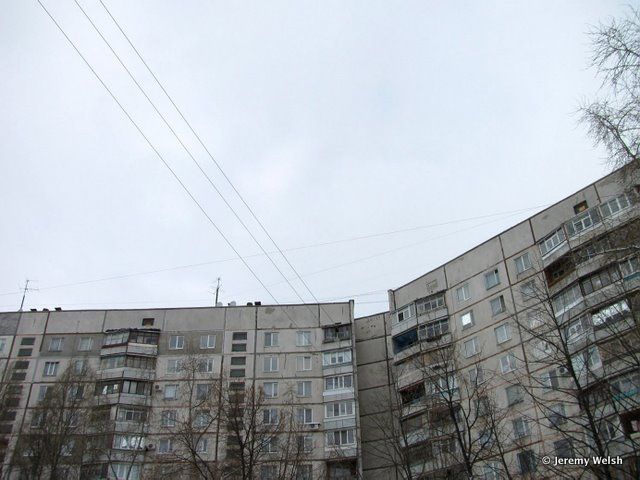
Unlike so many of the other apartment buildings we had passed, at least this one was a little less depressing, made possible by the fact that it was built much later, but by no means modern by U.S.-standards. However, recently, modern western-style, high-rises have begun to rapidly transforms Dnepropetrovsk’s skyline, despite the ghost of the Soviet Union hovering everywhere you look.
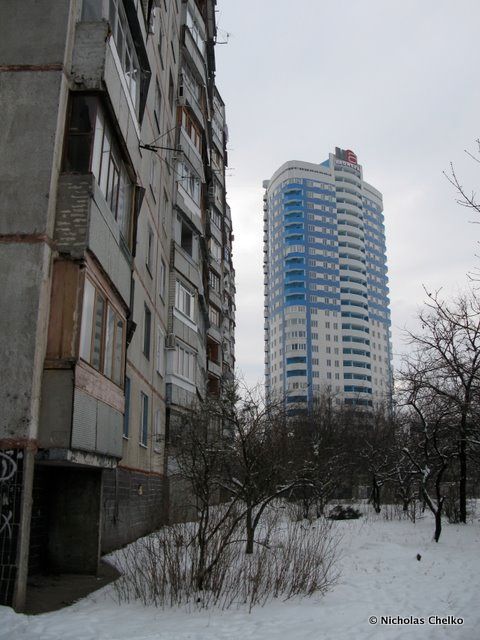
We parked in the building’s courtyard, which contained a few pieces of rusted playground equipment several children were playing on. A group of young boys were kicking around a soccer ball. Twisting through the playground were several of those hideous above ground pipes, marring any potential for anything resembling a scenic view. Two overflowing, foul-smelling garbage dumpsters butted up against the playground didn’t help matters, nor did the stray mutts and cats that roamed freely around the yard like they owned the place.
When we got out of the car, Sergei once again insisted on carrying my luggage, as we headed toward the apartment. Three old babushka women sat on a bench near the entranceway, glaring at me like the women at the airport.
Sergei dragged my luggage up the three crumbling, concrete steps led to the entrance of the building. I once again attempted to give him a hand, but he refused.
“Is there another entrance?,” I asked.
“No. Why?,” Katya asked.
“What does somebody do who is in a wheelchair or something?”
“They don’t leave the apartment,” she replied ever so matter-of-factly.
“Can’t they build a ramp?,” I asked.
“For just a small handful of people?” This was Ukrainian compassion at its finest.
Sergei proceeded to punch in a code on a date keypad that opened the heavy, wooden door, coated in the faded remnants of various stickers that had been posted over the decades.
I struggled to pull the door open for Katya and Sergei, revealing a dark and foreboding stairwell accented by peeling, presumably lead-coated green paint.
As we headed up the stairs, I asked if perhaps we should take the elevator, considering the weight of my luggage.
“Nobody’s legs are broken,” Sergei said in reply. Fortunately for him, we only had to go up one flight until we reached the apartment. As we stood on the dark landing, Katya rang the doorbell ”” if you want to call it a ring. It sounded more like a chainsaw trying to slice a bell in half. It echoed throughout the bowels of the musty stairwell.
Moments later, footsteps were heard, followed by the rattling of what sounded like a warden’s key chain opening a door. Then a second door. And then finally, the door that we stood in front of, revealing a cozy, warm interior, contrasting with the drab stairwell. We were immediately greeted by the delicious aroma of Ukrainian cuisine emanating from the kitchen.
Framed by the golden warmth of the apartment was Katya’s mother, Elena, who greeted me with an eager hug, as though I was a long-lost family member. She was wearing an apron – an accessory I rarely saw her without. Unlike Sergei’s powerful demeanor, Elena was a calm foil with a soft voice, typically reserved for when spoken to or when she had a profound observation to make. Although the consummate housewife, she was also a pediatrician who worked at a kindergarten.
We entered the cedar-paneled apartment, adorned with Turkish rugs, on both the hardwood floor and walls.
“Welcome,” she said in Russian.
“It’s a pleasure to meet you.”
A tall, slender woman with short hair entered. Taller than Katya, even.
“This is my sister, Nastya,” Katya said, introducing us.
I offered my hand to her, but Sergei quickly intercepted it, pulling me away from the doorframe from where I stood. I was confused.
“It’s a superstition to shake hands over a threshold,” Katya proceeded to explain. “But you’re safe now.” As I quickly discovered, superstitions are as embedded into the culture of Ukraine as vodka.
I proceeded to shake Nastya’s hand. “It is nice to meet you,” she said in broken English. Like Katya, Nastya also took English lessons, but never quite mastered the language as her little sister had. This is attributed to the fact that she is ten years older than Katya and started taking lessons at the same time Katya did. She also didn’t spend a year in the U.S.
For most of my trip, I rarely saw Nastya after that first night. She was either at the clinic where she worked as an ophthalmologist, or with her boyfriend — Dimitri — who once came by to boastfully show off his BB handgun and fake dog crap.
“Are you hungry?,” Elena asked.
“I don’t want to trouble you-“
“I’d only be troubled if you didn’t eat.”
Judging by the satisfying aroma filling my nostrils, I knew she had already gone through the trouble.
She instructed Katya to take me to my room, down at the end of the short hallway. The modest, but comfortable apartment consisted of three bedrooms, a living/dining room, an office, a shower and a toilet (each contained in their own separate room, about the size of a walk-in closet).
“This is your cage,” she said as we entered her room. I immediately noticed the lack of an essential piece of bedroom furniture: a bed. Then again, a bed would barely fit in a room so small. Where a bed should have been was a small couch.
“You don’t have a bed,” I pointed out.
She pointed to the couch.
“It turns into a bed.”
“So what’s with the rugs on the wall?,” I asked.
“Well, a little known secret about Ukrainian people is that we have the ability to walk on walls. Especially while drinking vodka.”
I wasn’t sure how to respond.
“Wait. What?”
“I’m just joking. It’s for insulation, since the heat in this building is a suck.”
“You mean sucks?”
“Yes. Sometimes, the heat doesn’t work at all. We’re all at the mercy of the building landlord. If one person in the building doesn’t pay, we all must suffer.”
A glass display case contained several dolls and toys from her childhood. Directly next to it was an open, screen-less window, overlooking the park and dumpsters below. The modern convenience known as screens apparently had not been introduced to Ukraine.
While passing by the room, Sergei grew concerned as I stared out the window and said something to me in Russian.
“What’s he saying?,” I asked.
“He said you shouldn’t be looking out the window.”
“Why?”
“Somebody might throw something at your eyes.”
“Seriously?”
“It does happen sometimes.”
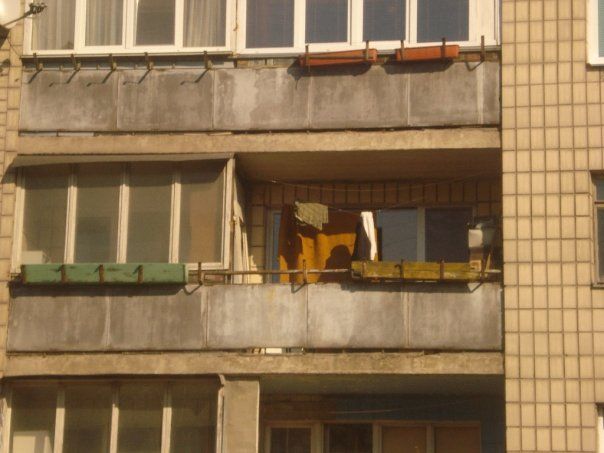 Photo by Monica Pevzner
Photo by Monica Pevzner
I decided to appease Ukrainian paranoia for the first of what would turn out to be many times. It is the same paranoia that has Sergei convinced that his phone line is tapped. Then again, what Ukrainian who lived through the Soviet Union doesn’t?
From the window, I re-directed my attention from the window to her desk, where I took note of several photographs were neatly displayed underneath a sheet of glass on her desk. The remaining photos featured various family members, her grandfather in his World War II military uniform and an black and white photograph of a little girl pulling a sled.
“Is this your mom?”
She looked. “It’s me!”
“Then why does it look like it was taken in 1955?”
“Color photographs were a luxury back then.”
Katya then left me to my own devices to unpack. I headed over to the window and looked down below. An older man in tattered clothing was digging through a dumpster, occasionally pulling out scraps of food that he eagerly devoured. And I couldn’t help but wonder if that delicious aroma filling reaching my nostrils was reaching his.
In the next installment: See Bobby experience Ukrainian cuisine … and his first shot of vodka.
Follow Untapped Cities on Twitter and Facebook. Get in touch with the author at www.foxplots.com, or @BobbyFox7
Due to unforeseen circumstances, Bobby no longer has has any of his photographs from Ukraine. All photos in this article are provided by Anna Pavlik, Nicholas Chelko, Jeremy Welsh and Monica Pevzner from their travels to Ukraine.


